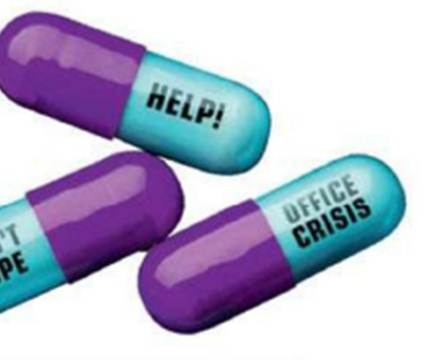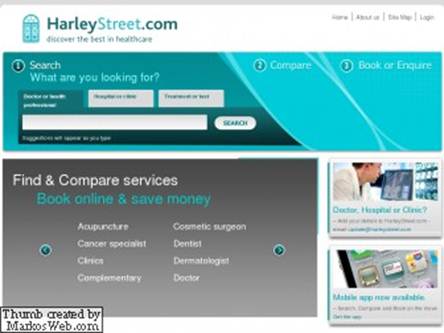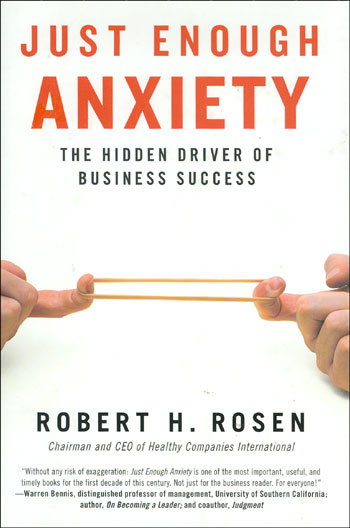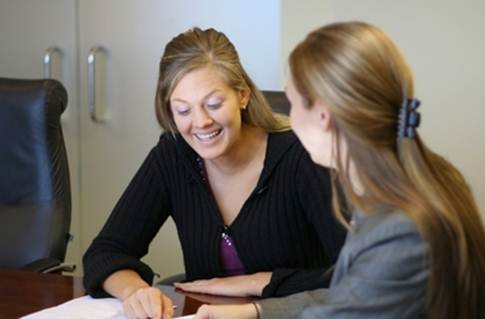Got butterflies again? More women are
using anti-anxiety drugs than ever, yet many experts now say a little panic
leads to success. So can panicking ever be productive?
Women don’t get much more successful than
the British Vogue editor Alexandra Shulman, which made her recent
admission that she still carries anti-anxiety drug Xanax in her handbag, as a
‘lucky charm’ against the panic attacks she used to have, all the more
shocking. But look at the numbers and you’ll see she’s not alone. Prescriptions
for anti-anxiety drugs have risen by a staggering 26% over the last four years,
taking the total prescribed by the NHS to seven million last year alone.

Anti-anxiety
drugs
Indeed, her declaration is just one sign
that we’re in the midst of an anxiety epidemic, caused by a trio of factors.
First, the recession is showing no signs of ending anytime soon, meaning we
remain in a hyper-alert state when it comes to worries about money and job
security. Second, our addiction to technology is, say experts, stopping us from
switching off – and encouraging us to compare our lives with those of our
friends (or at least the version they present on Facebook). And finally,
there’s the relentless pressure to have it and be it all. Being successful at
work or running a happy home is no longer enough, now you have to be able to
bake your own bread, run marathons and look like a supermodel while doing it.
Given this explosive combo of pressures,
it’s perhaps not surprising that so many of us are taking anti-anxiety drugs.
Most prescribed are benzodiazepines, such as Xanax and Valium, but they are
also the most addictive if used regularly. Dr William Shanahan, executive
medical director at London’s Capio Nightingale Hospital, treats many women
addicted to prescription drugs, and warns against seeing medication as a quick
fix to this kind of anxiety. ‘You take one pill and it works, so why not take
another one? Why not take three? Before you know it, you’re dependent and you
start experiencing the very symptoms you started taking them for’, he says.
PR exec Lisa Taylor, 31, is another
successful woman who carries her Valium in her handbag, ‘just in case’ anxiety
strikes and she needs to feel instantly calmer. Originally prescribed when she
was going through a bad time last year, she admits she now gets panicky if she
doesn’t have it with her.
Dr Michael Sinclair, consultant counseling
psychologist for harleystreet.com, stresses that anti-anxiety drugs should only
be used in conjunction with longer-term coping methods: ‘While medication can
be incredibly beneficial in managing debilitating symptoms short term, it
should always be prescribed alongside some form of therapy,’ he says. ‘It’s
much more important to learn how to manage your anxiety rather than masking it
with a pill.’

Website:
www.harleystreet.com
What is surprising is that anxiety has
shaken off it old connotations as a negative, debilitating emotion, and has
transformed into something we not only admit to experiencing, but actively
boast about – in the same way that stress has recently done. But while many of
the symptoms are the same (headache, a racing heart, shortness of breath, dry
mouth, butterflies, sweaty palms, nausea) the distinction is in the causes.
Stress result out of frustration and, it triggered by an event while anxiety
stems from fear and doesn’t need a trigger – which is why panic attacks, a sign
of extreme anxiety, can strike totally out of the blue. Long term, it can raise
your risk of heart disease and stroke, yet increasing numbers of successful
women are now declaring a certain level of anxiety (the odd sleepless night
that leads to an early-hours job application, for example) is necessary to
enable them to thrive. If you’re not anxious, so the subtext goes, you’re just
not driven enough.
Professor Craig Jackson, head of psychology
at Birmingham City University, agrees that some women see anxiety as measure of
effort. ‘For some people, being time poor and working in an atmosphere of
constant list-making can be very reassuring,’ he says. ‘It’s worn like a badge,
to prove to colleagues – and also reassure themselves – they’re vital to the
business.’
In the past, anxiety was judged as a sign
we weren’t up to the job and couldn’t deal with the pressure. But now, with
jobs and couldn’t deal with the pressures. But now, with jobs at risk, it seems
people would rather shoe just how hard they’re working by complaining of
headaches but ploughing through. ‘It’s the equivalent of seeing beads of sweat
on a manual labourer,’ says Michael Garnham, a psychotherapist at TTP Harley
Street, which specializes in addiction and disorder therapy. ‘Workers think
looking tired shows they’re working their hardest.’
Recruitment consultant Karen Thomas, 33,
admits using her anxiety to show her dedication to the job. ‘When I feel
irritable and on edge, it’s a sign I’m working really hard,’ she says. ‘I feel
like no one can tell me I’m not trying my best if my heart is pounding and I’m
light-headed.’

Just
Enough Anxiety: The Hidden Driver of Business Success
Robert Rosen, psychologist and author of Just
Enough Anxiety: The Hidden Driver of Business Success (Portfolio, $19.9) argues
that this shift in how we perceive is a positive. ‘We’ve historically seen
anxiety as a negative, and underestimate the value it plays to help us grow,’
he says. ‘We need it to achieve success.’ He claims the key to harnessing
anxiety is learning to accept that it’s part of life. ‘We live in an uncertain
world and you have to learn that what you’re feeling is totally natural. We
need to reframe anxiety – it’s simply your body and mind telling you to pay
attention.’
Felicity Allman, 23, has a successful
career in book publishing and is studying for a Master’s degree in her spare
time – and she’s convinced anxiety has helped her get where she is. ‘Being
completely wired enables me to tap into energy reserves I didn’t know I had, to
look at things in a new way or tackle unprecedented issues,’ she explains.
‘I’ve suffered with symptoms of anxiety, such as insomnia, restlessness and a
racing heart, for years and I wouldn’t have accomplished any of the things I
have without them. If something matters to me in life – and success matters to
me – it makes me anxious.’
But, while studies have shown that
performance increases with anxiety, that’s only true up to a point. It’s a case
of finding your own personal tipping point. ‘People who don’t experience any
anxiety at all are too complacent,’ says Dr Shanahan. ‘Say you’re going to a
job interview; you’ll naturally feel anxious beforehand. That’s healthy because
it’ll make you focus. But when the anxiety’s so string that you’re sick and it
doesn’t go away, that’s not healthy.’

you’re
going to a job interview; you’ll naturally feel anxious beforehand. That’s
healthy because it’ll make you focus
Deborah Reed, 28, is convinced she’s gone
beyond the ‘anxiety tipping point’. ‘Without that anxious aspect of my
personality I wouldn’t have done so well career-wise – it spurs me on. I have
so much adrenaline that I get lots done but when my anxiety symptoms are at
their worst, and I’m dizzy, sweating and feeling like I’m about to go mad, I
can barely achieve anything, which just makes me panic even more.’
There’s no way of avoiding anxiety
completely, but there are ways to stop symptoms in their tracks. First of all,
breathe. Sounds obvious, but when anxiety strikes, we tend to shallow breathe,
so slow down. Alexandra Shulman says it worked for her, and experts recommend
exhaling for double the amount of time you inhale (eg four counts ‘in’ and
eight counts ‘out’). Another instant calming technique involves clenching your
muscles as you inhale, then relaxing them as you exhale. Work down through your
face to your feet, and repeat the whole routine four times.
And bear in mind the effect your diet can
have. Sugar has been linked to anxiety, while caffeine will only make you feel
more jumpy. And, although alcohol may temporarily relax you, it’s a depressant,
so try to cut down. Regular exercise will clear your body of a build-up of the
flight-or-flight hormone adrenaline, and yoga or Pilates can help you relax.
So, how do you know if your anxiety is out
of control? If you’re on the right – or wrong – side of the tipping point/ our
quiz, devised with the help of Dr Sinclair, will help you diagnose your anxiety
levels – and discover what you should do about them.